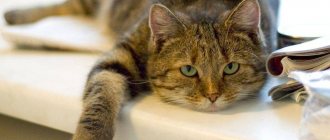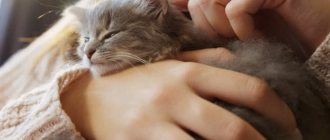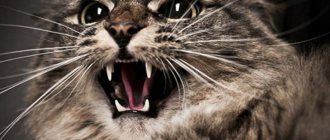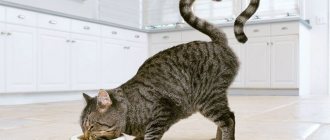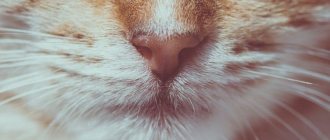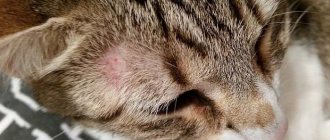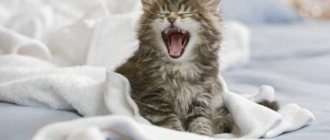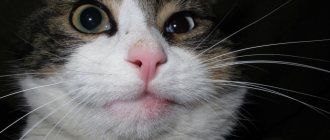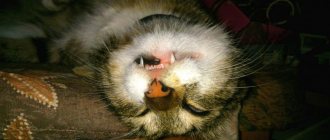A little about cat physiology
At different periods of life, a cat moves differently. All the little kitten’s calories are used for the growth of bones and muscles, the rest are spent on games.
In older cats, the body dries out due to old age and some other reasons:
- Stress and illness.
- Weakness and tooth loss.
- Lack of vitamins.
- Parasites.
Owners of an elderly pet should carefully monitor its condition and, if there is any deterioration, show the animal to a doctor. If the origins of poor appetite are teeth, the owner needs to purchase suitable food. For vitamin deficiency - a vitamin-mineral complex.
It is necessary to periodically treat your cat for helminths.
State of stress
Stress is a fairly common cause of weight loss. To cope with stress, it is necessary to eliminate the cause of its occurrence. The cat must be left alone for a while, she must come to her senses and understand that she is not in any danger. As a last resort, you can give the animal mild sedatives.
Everything in the house needs to be returned to its place, without disturbing the animal’s usual schedule. Feed from the same dishes and the same food, and this should be done by the same person as before. When the animal calms down and sees that everything in her life has improved, she will begin to eat normally and gain weight again.
In case of loss of appetite in cats, we recommend purchasing a Petstages mint stick toy. The mint flavor excites and increases appetite. Thanks to the nylon coating and its elasticity, cats are interested in playing with the toy, they get carried away by the process. In addition, at this time their oral cavity is cleared of plaque.
Optimal cat weight
The average weight of an adult healthy animal is from three to eight kilograms. Such a cat is fit, muscular, actively plays and moves, eats and drinks a lot.
Veterinarians determine the degree of nutrition by eye based on the following signs:
- Emaciation: absence of subcutaneous layers, visible ribs, strongly retracted abdomen, dense thin tail with a raised base.
- Disadvantage: The ribs and bones are still palpable and visible, but a small amount of fat is already present. Belly raised, hourglass figure.
- Ideal: thin subcutaneous fat layer, ribs are not visible but can be felt, the figure is proportional.
- Excess: too much fat, bones are difficult to feel. The belly is lowered; when viewed from above, the back is very wide.
- Dangerous excess: bones are not visible and cannot be felt, folds on the stomach, waist, paws, head.
Additional Information
It’s bad if your pet shows symptoms of exhaustion, this indicates the presence of a disease. If your cat has seriously lost weight, most likely the reason lies in the following reasons:
- Parasites – helminths – are the main reason for an animal’s thinness. Worms disrupt the cat's digestive processes. And the production of vital activity of parasites leads to departure. Therefore, it is necessary to give your pet anthelmintic drugs on time.
- Infectious diseases - pathologies such as calcevirosis, panleukopenia, and so on are accompanied by dehydration and loss of appetite. Symptoms: discharge from the nasal pharynx and eyes, abnormal bowel movements, high fever. If such signs appear, you should immediately contact a veterinarian. Lack of appropriate treatment can lead to death.
- Oncology - the presence of frightening formations can also cause thinness. If a tumor is suspected, the veterinarian will prescribe an ultrasound.
- Teeth and gums – it happens that a pet cannot eat because of its teeth. If an animal is interested in food, but finds it difficult to eat, you need to show it to a doctor.
- Other pathologies - almost any disease can lead to exhaustion. A cat loses weight if it has problems with the kidneys, liver, heart, thyroid gland, metabolic disorders, and so on. Only a qualified veterinarian can make an accurate diagnosis.
Any of the diseases requires immediate treatment. We must not forget about the condition of the cat; you should always visit veterinarians for preventative care . If your cat eats a lot but loses weight, the following reasons can be identified:
- Worms. Helminths try to destroy the pet’s body from the inside. Even if a cat eats a lot, he loses weight. Helminths get inside the animal from dirty clothes, unwashed hands, or a dirty tray.
- Damage to internal organs. Tests at a veterinary clinic will help answer the question of why the animal is exhausted. Disturbances in the gastrointestinal tract can also be noticed visually. These are lumps in the urine and abnormal stool, an unusual color. During the period of illness, the animal’s appetite decreases and it eats little.
- Stress. The problem may be the appearance of another animal. The cat's health is under real stress due to its nerves. Therefore, the once big cat may begin to lose weight in just a week.
- Summer weather . If a cat loses weight in the summer and has an excellent appetite, this is normal. In the summer season, the pet sheds its fur, and due to the heat, it eats less than in the cold winter.
- Age. An old cat eats less than a young one. This is due to his mobility. An old cat that is losing weight should still be checked by a specialist, but for pets that sleep a lot, weight loss is normal.
- Tumors. New formations on the body, and especially in the body, are difficult to detect. With benign formations, the pet should not lose weight.
- Feed. The quality of food determines the weight of the animal, how quickly it loses weight, how much it eats, all this affects the body. You cannot suddenly change your cat’s diet from dry to liquid or to homemade food. In this case, even a dog that is less picky will not be able to recover. Changing your pet’s diet is a consistent and slow process, during which he still loses weight.
You only need to worry when your pet quickly loses weight and becomes exhausted. In order to find out the degree of thinness of the cat, a condition scale was created.
It consists of five stages and characterizes the condition of the cat from obesity to exhaustion:
- Exhaustion: in adult pets, the tummy is strongly retracted, the figure resembles an hourglass. The tail is bony to the touch, without palpable fat deposits, the ribs are perfectly palpable and noticeable. The cat's waist is very narrow.
- Losing a kilogram is described by maintaining an hourglass-shaped figure, all bones can be easily palpated, and the tummy is retracted. The amount of fat in the rib area is extremely small.
- In a normal position, the animal looks slender, the tummy looks toned, and the waist is clearly defined . The ribs are easy to feel through the covering fat. If the pet is overweight, the waist will not be visible and the tummy will no longer be tucked in. The fat layer is very thick, the bones cannot always be felt.
- Obesity: the ribs under thick layers of fat are almost not palpable, the stomach partially hangs down due to a massive layer of fat, the back looks quite wide. Fat is noticeable even in the neck, muzzle, and paws.
In the second stage, you need to look at the general condition of the animal, its age and consult a veterinarian. If this period is missed and the cat is already exhausted, she will need serious treatment.
A pet can lose weight for physiological and pathological reasons. In the first option, most often no correction is required, in the second, the cat needs to be treated. You will have to concentrate on identifying the causes of weight loss and eliminating them.
ATTENTION! Symptoms can develop rapidly, quickly leading to serious illness and even death. That is why, with any symptoms of pathology, especially if it is accompanied by dangerous manifestations, the animal needs to be helped.
Physiological reasons for a cat losing weight
The condition of the animal is influenced by many factors, for example, living conditions, hormonal changes, character, changes in the cat’s life and others:
- Spring is the period when a cat needs to go for a walk, so food is often the last thing the animal thinks about. Its mass decreases at this time, but when all its needs are satisfied, it begins to recover.
- Changes in temperature: for example, before winter, mammals gain fat, losing it in warmer times.
- Any surprises in everyday life cause trauma to the animal. For example, having a child, moving, a new pet.
- A pregnant or postpartum cat usually has an excellent appetite as she feeds her babies. If there are too many kittens, the mother will lose weight, but after the end of the feeding period her weight will return to normal.
- Some breeds (Siamese, Abyssinians, Sphynxes, Bengals and others) have an excellent appetite, which does not affect their figure.
- The cat is sensitive to food, so changing food may not suit her at first, so she will experience a weight loss in the first week.
When should you not panic?
An animal's activity is the best evidence of health. A cat that constantly plays, runs, sleeps little and constantly asks for food is not at risk and periodically loses weight. The morning amount of food is burned in a matter of hours and therefore in the afternoon the pet will ask for more. But you should not overfeed your cat.
Old cats are already losing interest in games, losing weight, and it’s not a matter of illness. With age, the cat moves and studies less and less, and observes and evaluates more often. The fewer movements, the less energy is burned, and, accordingly, the minimum amount of food will be needed.
Mild poisoning for cats is a common situation, especially if the pet eats the same food as the owner. Diarrhea for two to three days does not indicate a serious illness. If the problem persists for more than a week, it is wise to contact a specialist.
Animals experience stressful situations more difficult than humans, but faster. The appearance of a kitten, puppy, child, scary cat plush toy or new person in the house can completely destroy the appetite and lead to the animal losing weight. There is no need to panic: within a couple of days the cat will return to its usual feeding schedule.
© shutterstock
Pathological reasons for a cat losing weight
A sudden change in your pet's appetite without reason is a bad sign. Gastrointestinal diseases, oncology or parasites cause terrible suffering to the cat. Without the intervention of specialists, the animal will die. Main pathologies requiring consultation with a doctor:
- Thinness is often caused by helminthiasis, that is, infection with worms. It occurs through dirty water, during communication between animals, through dirty objects, the hands of the owner, and also from cats to kittens.
- Cancerous tumors are a common cause of weight loss. The pet suffers, but does not have the opportunity to say about it. Unfortunately, many owners do not pay attention to their pet’s mood changes for a long time, so cancer is diagnosed too late.
- Many diseases of the digestive system initially manifest themselves as a change in preferences or a complete refusal of food by the cat. For example, pancreatitis.
What to do
A pet will not lose weight immediately, and therefore the owner may not notice the changes for a long time. As a result, the problem becomes obvious when the cat has lost a lot of weight.
It is advisable to immediately show the cat to a veterinarian. If this cannot be done, then the animal is provided with a quiet and calm place. He may meow restlessly, then he can be given a light sedative “Cat Bayun” or “Stop-Stress”.
Do not try to force feed an animal. You can try offering another food, for example, baby meat puree. The owner should not rely on the condition of the nose. Even if it is wet, this is not an indicator of health.
You should immediately take your cat to the vet if the following symptoms occur:
- heat;
- loss of consciousness;
- apathy;
- frequent vomiting.
The veterinarian will examine the pet, do tests and prescribe treatment.
Important! In case of intestinal obstruction, urgent surgery is needed, since without it the animal will die.
When a cat refuses to eat for a long time, but regularly drinks water and does not have accompanying symptoms of diseases, the owner should:
- Stop giving the animal increased attention, provide the cat with a quiet place with comfortable bedding, where he will not be disturbed by other household members. If a cat is trying to hide, do not disturb the animal.
- Try changing your pet's menu.
Be sure to read:
A cat refuses to eat: reasons, why it’s dangerous, first aid, what to do, how to increase the animal’s appetite
If alarming symptoms have been added to the refusal to eat, or behavior has changed, it is necessary to undergo an examination at a veterinary clinic.
We suggest you read: Seizures in cats: causes, first aid
The veterinarian will examine the oral cavity, measure body temperature, palpate the abdomen, weigh the animal, and prescribe tests. Having identified the picture of the disease, he will recommend adequate treatment. You need to follow the recommendations and give your cat medications on time.
Safe and dangerous symptoms
If your cat is healthy but losing weight, there is no need to worry if he has:
- A specific breed - Somali, Abyssinian, Bengal.
- Active, mobile lifestyle.
- Age over ten years.
- Changes in life (moving to a new home, change of owners, new litter box)
If the pet is calm, but the weight loss is too sudden, then the following symptoms will be a sign of the disease:
- Changing your lifestyle from active to sluggish and apathetic.
- Drowsiness.
- The appearance of an unpleasant odor.
- Loss of tufts of fur, matting in tangles.
- Blood in excrement.
- Diarrhea, nausea or constipation.
- Pallor of the mucous membranes.
- Temperature increase.
Host actions
First of all, you need to see a doctor. He will accurately determine the cause and select the appropriate treatment or help solve the problem in another way:
- Diseases. The veterinarian will prescribe tests, then therapy.
- Senile wear of teeth. The solution is to buy new soft food.
- Parasites. The doctor will prescribe anthelmintic drugs.
- Change of food. In this case, it is recommended to introduce innovations gradually, allowing the animal to get used to it.
- Stress. If your cat is depressed by changes, you need to give her time to calm down. In serious cases, the doctor will prescribe sedatives.
- Maturation. If a pet needs breeding, you need to find a mate for it or castrate it.
Mr. Cat recommends: diagnosis and treatment
So, the cat is thin, lethargic and apathetic. You need to go with her to the clinic or call a doctor at home.
The veterinarian will ask about the animal’s age, nutrition and all other details of the animal’s life, the owner must provide accurate information for a better diagnosis.
After the examination, the pet will be sent for blood tests, stool tests and x-rays. Once the problem is clear, your doctor may prescribe the following:
- Medicines.
- Change of diet.
- Vitamin supplements.
- Change of activity mode.
Natural food
A cat's diet should contain two types of products: meat and fermented milk.
The meat diet must include beef, cut into small pieces. To get vitamins, you need to add vegetables or special additives to the meat. In pet stores you can buy special powders containing all the necessary vitamins.
ATTENTION! Fermented milk products include low-fat cottage cheese and kefir (1%). Cottage cheese should be on a cat’s menu 1-2 times a week.
Prevention
The owner must provide the pet with good and proper nutrition, carefully monitoring the regime and diet, and the availability of clean drinking water. A starving cat loses its beauty, becomes embittered and sick. Cheap food or table food leads to problems with the pet’s teeth and the entire digestive system.
It is important to remember about vaccinations. Many people naively believe that if an animal lives in an apartment, it will not get sick. Viruses and infections can be carried on clothes and shoes, and a domestic cat is much more susceptible to them than an outdoor cat.
A pet walking on its own should be checked for ticks in the spring and autumn, as they not only cause pain, but also carry various viral diseases.
If any change of situation is planned (the appearance of children, new pets, moving), the owner should be near the animal more often. Everything new should be introduced gradually, giving your pet space and time to adapt.
